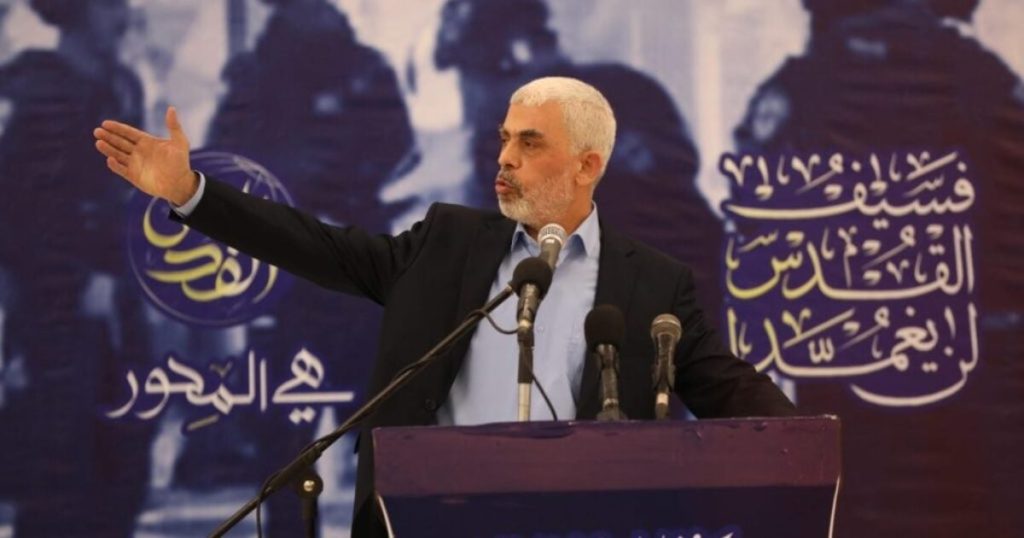Hamas leader, courtesy of Days of Palestine – Gaza
The recent killing of Ismail Haniyeh, widely considered Hamas’s overall leader, by Israeli forces necessitates a shakeup in the leadership. The most likely candidate for overall leadership of Hamas is Yahya Sinwar, the leader of the Hamas movement within the Gaza Strip.
He is also considered to be the group’s wartime leader and believed to be the mastermind behind the October 7 attack on Israel. According to U.S. Secretary of State Antony Blinken, he is believed to be hiding “10 stories underground” in Gaza, meaning that he is thought to still be at large somewhere in the tunnel network.
Israeli intelligence claims that they actually know where Sinwar is, but he is using the Israeli hostages as a human shield and that his position is loaded with explosives which he will detonate if Israel attacks.
Yahya Sinwar was born in 1962 in the Khan Younis refugee camp in Gaza. A year after Hamas was founded in 1987, he established its internal security service, which targeted alleged Palestinian collaborators with Israel.
Sinwar was arrested by Israel three times and was sentenced to four life terms in 1988 for planning the abduction and murder of two Israeli soldiers and the murder of four Palestinians. However, in 2011, he was among 1,027 Palestinian and Israeli Arab prisoners released by Israel in exchange for an Israeli soldier held captive by Hamas for over five years.
Upon his release, Sinwar, also known as “the Butcher of Khan Younis,” resumed his role as a prominent leader in Hamas and was appointed head of the group’s political bureau in the Gaza Strip in 2017, making him Hamas’s leader in the territory. The United States designated and sanctioned Sinwar as an international terrorist.
Sinwar is considered more radical than Haniyeh. CIA Director Burns stated at a conference that he believes Sinwar is under pressure from Hamas leaders, who are weary of months of war and tens of thousands of civilian casualties, to end the conflict.
However, given Sinwar’s more extreme stance, it seems he believes that civilian casualties advance the Palestinian cause. In a recent message, he told Hamas leaders negotiating with Qatari and Egyptian officials, “We have the Israelis right where we want them.”
As a result, a ceasefire is less likely under his command, with negotiations serving merely as a stalling tactic. These negotiations and ceasefires give Hamas time to regroup, resupply, and launch counterattacks against Israel.
When Sinwar was in prison in Israel, he told the head of corrections that he believed he understood the Israeli psyche and had discovered a weakness. He sees Israel’s concern for the lives of the hostages as a vulnerability he can exploit. It is unlikely that Israel would be willing to risk the hostages’ lives in order to eliminate Sinwar.
Yahya Sinwar embraces bloodshed and has defied numerous attempts to kill him. Although in hiding, he continues to manage Hamas’s terrorist activities, deciding when to intensify the war and when to dial it back.
He issues letters, statements, and messages to ceasefire negotiators, telling them to ask for more while also expressing his desire for the war to continue and for more civilians to die.
Sinwar has spent most of his life dedicated to the destruction of Israel and the independence of Palestine. However, it is important to recognize that he wants Hamas to rule an independent Palestine, which puts his goals in conflict with those of Fatah.
Both Hamas and Fatah seek to lead an independent Palestine, but they have fundamentally different ideologies, strategies, and visions for the future of the Palestinian territories.
This rivalry has led to significant political and sometimes violent conflict between the two groups, with each vying for dominance and legitimacy among the Palestinian population.
The recent unity agreement signed by 14 Palestinian factions, brokered by China, aims to foster cooperation and reduce internal conflicts. However, the practical impact on the longstanding rivalry between Hamas and Fatah remains uncertain. Despite the agreement, Sinwar’s aspirations for Hamas’s leadership likely remain unchanged, maintaining the underlying tension between the two factions.
The post Leadership Transition in Hamas Amidst Israeli Strikes appeared first on The Gateway Pundit.







